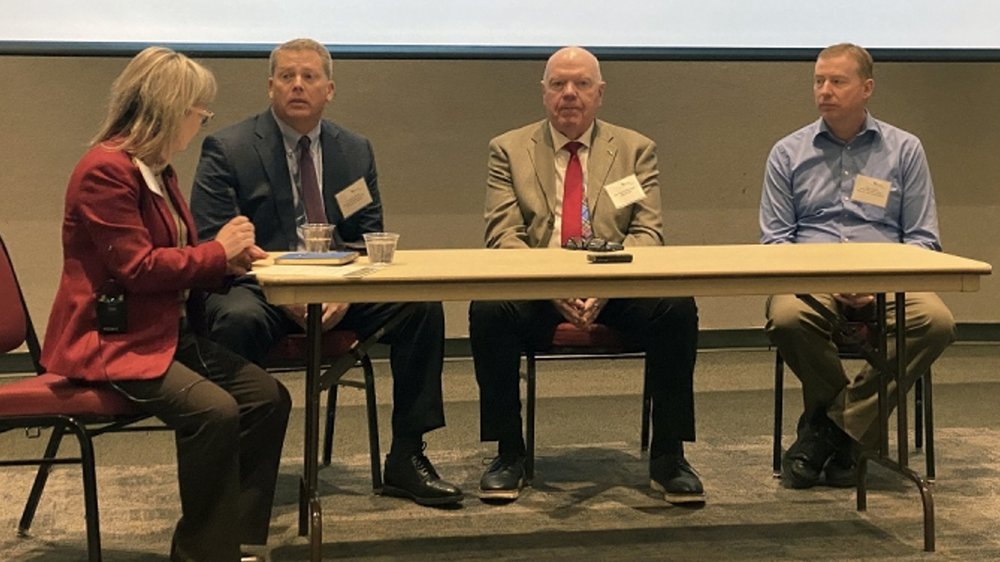When you come to our regional Digital Transition Discussions, you’ll be in good company. In addition to our hand-selected sponsoring companies, we also bring in the region’s top thought leaders to take part in our administrator panel discussions. They are always lots of fun, and one of the most popular features of every regional event. The result is often the advancement of wisdom in key discussion areas, and more often than not, an opportunity to quicken the discussion towards permanent solutions.
Leading the panel discussions is LeiLani Cauthen, CEO of the Learning Counsel and one of America’s top education thought leaders in her own right. These participants you see here are a good example of the types of individuals you will be spending the day with at these events.
One of our recent discussion topics is the fact that education is at a point in its evolution when its very structure is changing. To start the discussion, Cauthen posed, “Since the pandemic came into play, we're in need of a structural shift. We're playing with space and time in every single school and district in America and people seem to have moved in their expectations. So, let's talk about your thoughts and maybe what you see in your own district for structural shift.”
Dr. Ryan C. Hansen, Director of Digital Learning from the Davis School District said, “One of the things I think all parents love about what the pandemic did is it created more flexibility for the family. If a student wants to end their day early and go to work or train athletically, there's lots of things that they can do, maybe a later start because they moved their English class to an online class. We even have different options available for kids as to what online looks like. There's an online classroom, there's an online independent study. There's totally open ended online. We can help kids find what works best for them. They can still keep the traditional experience, and then they can try online things as well.
Senator Howard Stephenson, Retired, Utah State Senate added, “In Utah, we have had an opportunity for the legislature and the state board of education to work together on a digital teaching and learning master plan for five or six years. And it was a collaborative effort. The legislature funded it, the state board of education themed it and the LEAs trained in it. We didn't know COVID was coming, but better than any other state I think, we were able to hit the ground running because we had already trained the teachers in the effective use of computer assisted instructional software for 20 minutes, a half hour day in math and that same period in English or reading. The Education Commission of the States gave Utah its Frank Newman award for innovation and education because of the way we worked this out.”
Sam Quantz, Chief Information Officer from the Salt Lake City School District said, “The structural shift that I've seen is more of a paradigm shift. Prior to the pandemic, you’d look at technology in the classroom or in public education as a novelty, you'd see it in pockets. Maybe it was a whole school. Maybe it was an individual classroom, a specific student. But the pandemic really brought it out to the forefront, how much technology is needed. And it's a cultural shift that it's now an expectation. We're even talking about how it's an expectation that schools are ISPs, internet service providers for students. Schools didn't do that. The demand from what I've seen has increased 10, 20-fold for new software to review, new devices, new technology, just to meet the increased demand of what the pandemic's brought on.”
Chris Knutsen, Superintendent at Florence Unified School District said, “Two years ago, I was sitting in a superintendents’ symposium in LA in February and the main keynote guy comes on and he says, ‘You know, basically, are you guys ready to educate all your kids online? Because it's coming.’ We didn't really know much about COVID at the time and here it is two years later. We know that COVID has been a very bad thing, and it's been a very challenging issue to deal with for all schools across our country. First thing I did is I walked outside, and I called my tech director and I said, ‘all right, are we going to be able to do this?’
“You know, Looking back over the last two years, the shift is real and I think we've navigated about as well as we could. I mean, we were able to get all our kids online and I think it went rather well. And I think we've learned a lot. We've learned that technology is something that we can use in a better way in the future. So that's where we're headed.”
Tony Camp, Executive Director of Teaching and Learning at Phoenix Union High School District added, “I think everybody did the best they could, given the circumstances of shifting. In my district, we had more computers than students if you were to inventory them, but we were not a 1:1 district. So, it pleased me in the fact that it forced us into that world. That was an inevitability I believe. Instead of technology being a supplemental resource or an addition to instruction, it has now become an integral part of the work we do.”
Dr. Gayle Galligan, Deputy Superintendent of Curriculum, Instruction and Assessment at Deer Valley Unified School District said, “We really focused on the S.A.M. model and pushed that through and tried to work that minimally into our four content areas. We were bubbling along with that, as well as a flipped classroom model working with mainly our math teachers, helping them to think about how can you flip your math classroom and think about it just a little bit differently. And then we managed to get into a pandemic. And so in our mind, we decided we're not going to waste a good pandemic.”
As a follow-up question and point of discussion, LeiLani Cauthen asked, “How do you feel about needing the ultimate tech in order to have the ultimate in humanity and personalized learning?”
According to Sam Quantz, “Personalized learning is the key. I think that's what classrooms and teachers and districts want. Every single student that walks through their door has an education tailored to their needs. Now they may look like the student next to them a little bit. But ideally, I learn a little bit differently than Senator Stevenson does. Right? And what are the tools that will help me to do that? So, from an infrastructure standpoint, I look at it as standardization helps me support, right? No increase in staff prioritization helps me. So how do we balance standardization versus the innovation needed to provide personalized instruction? You could go through and provide a single application for every single student, but the management of that would be challenging.”
For Senator Howard Stephenson, “the most important thing is to get every child competent at grade level in reading, writing, and math. All the rest of an education is important, but if you don't have that base of Bloom's Taxonomy of academic skills and content knowledge in reading, writing, and math, how do you achieve all the rest? The upper levels of synthesis, evaluation, critical thinking, and all those kinds of things that we really want our students to understand and to be able to do, because that that's how you live life. But if you don't have math and reading down, you're going to be struggling with those other things.”
Dr. Ryan C. Hansen added, “It's a great topic. And to build on the senator's comments, the tech really becomes the extension of a great teacher. Teachers will never be replaced. One of the challenges of technology is, there are no shortcuts with the technology. It requires planning. It requires the thoughtful placement of resources, uh, all of those things. When we effectively do that, it magnifies the impact that a teacher can have, or that the teacher does have.”
Your invitation to attend
Every Digital Transition Discussion Event includes a panel discussion, invariably featuring some of the brightest minds in education. There is also an opportunity for sponsors to feature a short video as well as an opportunity to address the attendees. But perhaps the most valuable opportunity is to be in the room, spending the better part of the day in an intimate setting with real decision makers. Relationships are a natural, and business stems from those relationships. To learn more about our in-person events, contact Annette Erwin, Annette@learningcounsel.com.











